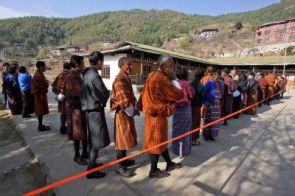Political discourse has widened in Bhutan, as candidates are raising key issues like development, increase in income gap, and increasing unemployment among the youth, reports Shubha Singh.
 Bhutan will consolidate its five-year-old democracy by holding the second elections to its National Council (upper house) and National Assembly (lower house) in the next few weeks. Elections for the 25-member National Council are to take place on April 23, and are to be followed by voting for the National Assembly in June. Dates for the National Assembly election are to be announced later.
Bhutan will consolidate its five-year-old democracy by holding the second elections to its National Council (upper house) and National Assembly (lower house) in the next few weeks. Elections for the 25-member National Council are to take place on April 23, and are to be followed by voting for the National Assembly in June. Dates for the National Assembly election are to be announced later.
Bhutan held its first election in 2008 when about 80 per cent of the electorate cast their votes. The elections were more of a festival; people were unfamiliar with the process but had turned out to vote because they had been urged to do so to make the elections a success. Bhutan’s democratisation was initiated by King Jigme Khesar Namgyel and his father, Jigme Singye Wangchuk who relinquished absolute power and actively encouraged people to participate in the elections in 2008.
Bhutan transited from a ruling royalty to become a constitutional monarchy with a parliamentary form of government with the adoption of a new constitution in 2008. Political parties were formed in Bhutan only after the government lifted the ban on political parties in 2007 just before the first elections to the National Council took place.
In the past five years, parliamentary democracy has taken root in Bhutan; there are now five political parties that are taking part in the forthcoming elections. Three new political parties were registered with their election symbols by the Bhutan Election Commission in January this year. The Bhutanese people have learnt what parliamentary democracy means as they have watched the elected leaders debate important issues in the National Assembly.
In 2008, the Druk Phuensum Tshogpa or Bhutan United Party led by Jigme Thinley, who had served two terms as prime minister earlier, won a landslide victory, winning 45 seats. The People’s Democratic Party won the remaining two seats and formed the opposition in the National Assembly. Despite the overwhelming majority of the ruling party, the opposition with only two members in the National Assembly were able to carry on lively debates on a number of important issues.
Bhutan further strengthened the democratisation process by holding local government elections in 2011. The local elections were preceded by lengthy debates in the National Assembly over restructuring of municipal bodies and the proposed Local Government Act. The bill was eventually passed after making changes in some of its clauses.
The five political parties that are contesting the elections are: Druk Phuensum Tshogpa, the present ruling party, People’s Democratic Party, Bhutan Kuen-Ngyam Party, Druk Chirwang Tshogpa and Druk Nyamrup Tshogpa. There are 67 candidates for the 20 elected seats in the National Council (an additional five members are appointed by the King).
Bhutan has an electorate of about 400,000. Under Bhutan’s electoral laws only university graduates can contest parliamentary elections. This clause has caused some dissatisfaction as it restricts the candidates to the young, educated elite. It has ruled out the majority of the older generation as well as women, who have not had a university education.
The National Council has six women members while the National Assembly had four women members. There are about 100 women elected to various positions in the local government bodies. There is some sign of change as the newly registered DCT party is headed by former diplomat and social activist, Lily Wangchuk. Wangchuk was the head of the PDP’s women’s wing earlier; her party’s main focus development at the grassroots and on the rights of women and marginalised groups.
The 67 candidates have been holding public meetings and debates in their districts. The Bhutan Election Commission has arranged common forum platforms for each district where the competing candidates can present their views. The candidates move together from location to location, often sharing transportation and even accommodation for convenience and to restrict costs.
The political discourse is widening as candidates are raising issues such as the development that has taken place in Bhutan, the increase in the income gap, growing urban migration and increasing unemployment among the youth.
The opposition party’s leader in the National Assembly, Tshering Tobgay said in an interview to the Bhutanese newspaper, Kuensel that if his party came to power, “our first priority, like that of any other party that comes to power, would be to undo the damages done by DPT. Government expenditure has been excessive, the economy is in a mess.”
Tobgay went on to list other issues for the election campaign such as youth unemployment, roads in urgent need of repair, corruption to be tackled boldly, poverty and the dismal agricultural production.









 © 2025
© 2025